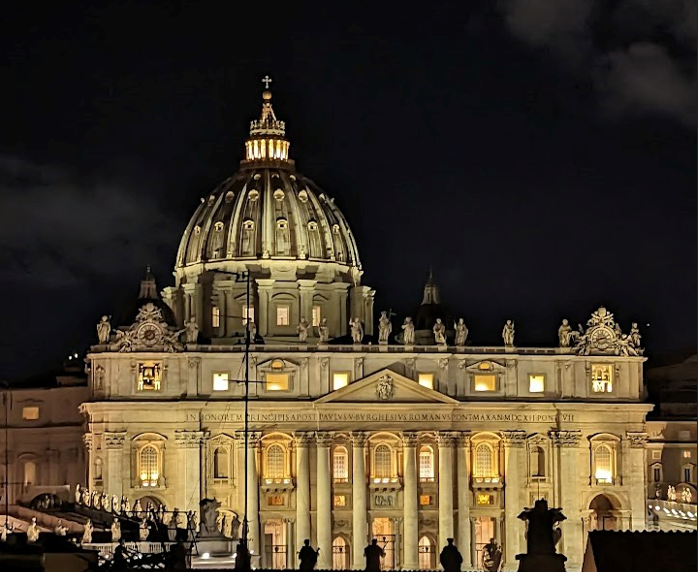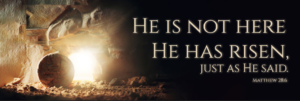
ADSUMUS SANCTE SPIRITUS: A REFLECTION ON SYNOD 2021-2024 IN ROME

Adsumus Sancte Spiritus. We stand before You, Holy Spirit!
October has been an unprecedented month for the Catholic church. Delegates from around the world have been called together by the Holy Father in synod – from the Greek syn (together) hodos (way). As representatives of the People of God they have been tasked with discerning the pathway the church is called to walk toward the future. Laity, ordained and vowed religious. Men and women from every continent. Conservatives, liberals and all manner of perspectives in between. All sitting at round tables. All referring to one another by first names, dispensing with titles. Gathered in prayer and committed to deep listening.
This was the 16th Ordinary General Assembly of the Synod of Bishops. And has been anything but ordinary. Preparation began in October 2021 with the call of Pope Francis to the whole world to participate in listening sessions. (This was the single largest consultation in human history!) These listening sessions were then summarized first by nation, then by continent and from them a working document – the Instrumentum Laboris – was developed. Then the Holy Father chose people from around the world to join with the bishops in the first-ever synod since the early church to extend voting privileges beyond the bishops. Delegates have now returned home and will reconvene after spending a year pondering and praying about the Spirit’s call to our church in this time.
Adsumus Sancte Spiritus. We stand before You, Holy Spirit!
This is the prayer that has historically begun councils of the church for hundreds of years. Attributed to 6th century saint, St. Isidore of Seville it was prayed before each session of the Second Vatican Council (1962-1965), and it began this synod as well. Synodality is, at its heart, a prayer. In fact, says Pope Francis, “without prayer, there will be no synod.” Thus, the synod began with an ecumenical prayer vigil in St. Peter’s Square. How extraordinary to begin a synod of the Roman Catholic Church by first asking for the companionship in prayer of the leaders of so many Christian traditions! Also, before conversations began, synod participants were led on a three-day retreat. Celebrations of the Eucharist and silence were vital aspects of this retreat. Finally, at the round table discussions, after everyone had their turn to speak, delegates sat in silence asking for the Spirit’s help as they searched for the wisdom in the words of their peers.
Adsumus Sancte Spiritus. We stand before You, Holy Spirit!
At Vatican II, the church was challenged to “scrutinize the signs of the times and interpret them in the light of the Gospel” (Gaudium et Spes, 4). What are the signs of our times in 2023? The global pandemic and the climate crisis have certainly shown us that “no one is saved alone; we can only be saved together.” There is increasing secularity and disaffiliation from the Church and the continued threats of war and poverty. The sexual abuse crisis, the church’s failure in reference to Indigenous peoples, the developing awareness of the church’s legacy of colonialism and slavery, and revelations of financial corruption and abuse of power in the church have shown us that the call to conversion pertains to the very church itself. These sins of the church are obstacles to our ability to proclaim the Gospel with credibility. The Holy Father is not shy to speak about this and encourages us to examine misuse of power, prejudice and distorted practices that are not rooted in the Gospel. (PD, 2)
These “signs of the time” call for renewal. Synodality, according to Pope Francis, is the way we are to do this. We must listen, dialogue and discern. And who must do this? As the Holy Father said at World Youth Day in Portugal, the church is “todos, todos, todos.” (Everyone, everyone, everyone.) This call from Pope Francis to engage in discernment and dialogue has meant that many people not directly involved in the synod have been gathering in parishes around the world and also in Rome itself to listen and to speak what they hear the Spirit saying to them.* Like Saints Peter and Paul, the groups do not all agree on everything. They have different opinions, perspectives, priorities and strategies. Like Franciscans and Jesuits and Dominicans, they have different charisms. They are, however, united in their love of the church and desire to follow the Gospel in fidelity.
Synodality depends upon “recognizing and appreciating the wealth and the variety of the gifts and charisms that the Spirit liberally bestows” on every member of the Body of Christ (Preparatory Document, 2). Using these God-given gifts, every member of the baptised faithful are called to co-responsibility in the proclamation of the Gospel and in building “a more beautiful and habitable world.” This will require some conversion of us who are accustomed to a more clerical model of church.
Adsumus Sancte Spiritus. We stand before You, Holy Spirit!
Many believe that the construction of a synodal church holds great promise for a healthier, holier church. But some are concerned. As Fr. Radcliffe noted: “For some, this is the fear of change. For others, the fear that not much will change.” (Meditation 1) For this reason, he counselled synod delegates, “Let us begin by praying that the Lord will free our hearts from fear.” The call of synodality is for everyone to speak with parrhesia and courageously trust that the Spirit of God will sort out the wisdom that is meant to direct the church in our time. Parrhesia is a term Francis used to refer to boldly speaking the truth in freedom. No one person, no one group can singularly decide what God wants for the church. As Fr. Radcliffe said in his synodal retreat meditation on Emmaus, we are all, each and every one “mendicants after the Truth.”
Adsumus Sancte Spiritus. We stand before You, Holy Spirit!
We stand before You, Holy Spirit,
as we gather together in Your name.
With You alone to guide us,
make Yourself at home in our hearts;
Teach us the way we must go
and how we are to pursue it.
We are weak and sinful;
do not let us promote disorder.
Do not let ignorance
lead us down the wrong path
nor partiality influence our actions.
Let us find in You our unity
so that we may journey together
to eternal life
and not stray from the way of truth
and what is right.
All this we ask of You,
who are at work in every place and time,
in the communion of the Father and the Son,
forever and ever.
Amen.
*I was fortunate to be in Rome this October. Part of this time was spent as a delegate of Concerned Lay Catholics – a group advocating for fuller lay participation in the church. While there we had the opportunity to meet with journalists, theologians and voting members involved in the synod. Each day as I walked by the building where the synod was taking place, prayers of gratitude and hope emerged spontaneously.
You can visit the synod website to read the Letter to the People of God and a wealth of news and information about synodality: www.synod.va
Christine Way Skinner is a doctoral student at Regis St. Michael’s at the Toronto School of Theology and has been a lay pastoral minister for more than 30 years. Together with her husband, Michael, she has parented 6 wonderful children. She has written a number of books for Novalis on living the Catholic faith for both adults and children.


